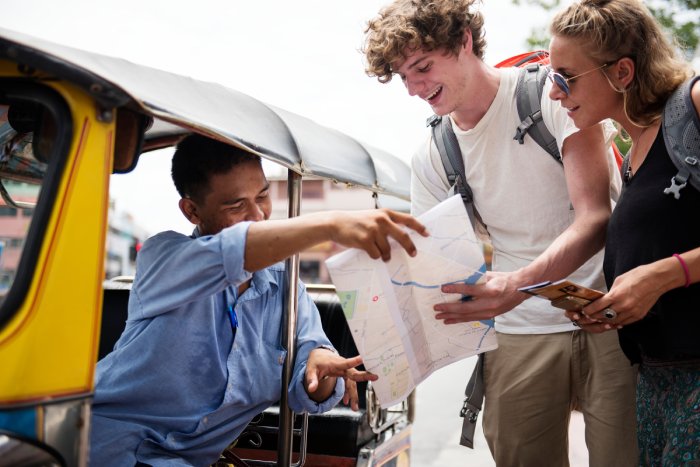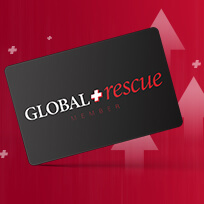Artificial Intelligence (or AI) has been around for a while, but not like we see it today. With almost endless ability to interact with us, answer our questions, write speeches, proposals and more, it’s clearly an attractive tool with potential applications across many spheres of life.
But can you use AI for travel? Is an AI travel agent in your future? Do you need an AI vacation planner? What are the pros and cons of AI when it comes to travel and trip planning?
The short answer to all is yes, or at least, maybe. Caveats abound.
Thinking of using AI to help plan your next trip? Take these pros and cons into account as you plan.
The Pros of Planning a Trip Using AI
Cuts down on research time – Trip planning is one of the best places to use AI, as it can simplify your process and cut down significantly on research time.
“Instead of slogging through hours of research, users get similar results with a quick conversation with AI,” Abigail Bassett wrote for National Geographic.
Digital nomad pioneer Olumide Gbenro uses AI to help him plan the practical parts of his life. He built an AI travel guide, which tells him the best places to visit and gives advice on the fastest travel routes.

Provides quick on-the-go advice – Any trip will have its hiccups, and asking AI for help can yield quick results the moment you need them. But how do you ask?
The benefits of using AI are all in how you craft your query.
Bassett recommends being as specific as you can with your question. “The more information you can give, the better your output will be.”
Ross Borden of Matador Network, the company behind GuideGeek, a travel AI chat, told National Geographic, “it’s crucial to ask questions in your native language. AI models can speak and understand many languages, and your grammar matters: The more accurate your punctuation, spelling, and grammar, the better the AI will be able to understand you.”
It’s essential to be specific. For example, we asked AI what the three best places to visit in Ireland are as an American. The answer? Dublin, the Cliffs of Moher, and the Ring of Kerry.
Then we asked AI what the three best places to visit in Ireland are as an American of Irish descent visiting for the first time in October. The answer? Dublin, County Kerry, and Galway.
With AI you get specific responses based on your query, but there’s no follow-up in the way a live agent or an excursion guide would pose additional questions to customize your trip plan.
[Related Reading: How To Travel Today: Plan Ahead and Be Patient]
The Cons of Planning a Trip Using AI
Information may be outdated – The free ChatGPT data is only as recent as September 2021, so its answers may no longer be relevant.
Olumide has seen this in his travels, with AI offering outdated recommendations like attractions or ticket prices no longer available.
For this reason, “experts recommend that travelers use AI as a rough outline or starting point—and not rely on it alone,” Bassett writes.
Lacks human perspective – Olumide said he notices the lack of human perspective in AI results.
“The beauty of reviews for places to travel to is that you hear it from a real person,” he said. “Until it starts taking real reviews and making it part of the AI’s ‘brain,’ it won’t be quite as valuable as real people.”
Might be biased – AI confessed its “systems are only as good as the data it’s trained on. If the data used to train the AI is biased, then the AI will also be biased. This can lead to serious consequences, such as discrimination against certain groups of people or inaccurate predictions.”
Chris Dong for AFAR agrees: “ChatGPT’s inputs aren’t clearly defined, which means the information it offers has the potential to be manipulated. If the proper guardrails aren’t put in place, answers can be heavily influenced by actors who feel like they can game the system.”
“Because of this, AI, in general, is best used as a sort of augmentation of humans,” Hannah Mieczkowski said in AFAR. Mieczkowski is an AI expert who holds a Ph.D. degree in human and AI interaction from Stanford University.
“I don’t believe there’s ever going to be a time in which these AI models are fully self-sufficient,” she added.

Can’t analyze trips for safety or address medical concerns – With an outdated system, AI may recommend travelers visit a country that’s currently in political turmoil but wasn’t back in 2021. It also may not provide accurate medical solutions, such as where to seek medical care in the event of an emergency.
For travelers with disabilities, it may not recommend accessible locations, or it may not be aware that some locations have become more accessible in recent years.
Lacks common sense – “AI systems lack the ability to understand common sense, which can lead to errors or unexpected results,” the system admits.
This gets tricky when planning a trip for a group of people, who may have various needs or desires for the trip. AI will not deliver the nuanced recommendations travelers may need.
Lacks creativity – AI acknowledged it “lacks the ability to be creative and come up with new ideas or solutions that are not part of their programming. This makes it limited in its problem-solving abilities, and it may not be able to adapt to new situations or scenarios.”
This can present problems in trip planning, as AI will tend to recommend generic vacation locations, rather than thinking outside the box to encourage travelers to try something different, while still meeting their travel desires.
“This can have an unintended negative impact on sustainability,” noted Seth Borko in AFAR. Borko is a senior research analyst at Skift and author of an April 2023 report titled “Generative AI’s Impact on Travel.”
“It could make overtourism worse by concentrating tourists rather than dispersing them,” he said.
For a look at these cons in action, read this article by Jordan Waller of The Points Guy, in which he regales his readers with stories from his AI-planned trip to Portugal.
Now that you know the risks, give AI a try as you plan your next trip. But take its answers lightly and don’t miss out on the value of a real, human travel agent to help you plan your dream itinerary.
And as always, Global Rescue is there for your medical and security needs, offering evacuation services AI could never replace.
We told AI we were traveling internationally and asked if we should get a Global Rescue membership. AI said, “Deciding whether to get a Global Rescue membership for international travel depends on various factors such as your destination, activities planned, personal health considerations, and level of comfort with the available local healthcare services. Global Rescue provides emergency medical evacuation and other travel-related services, which can be valuable in certain situations.
Helpful? You decide.











